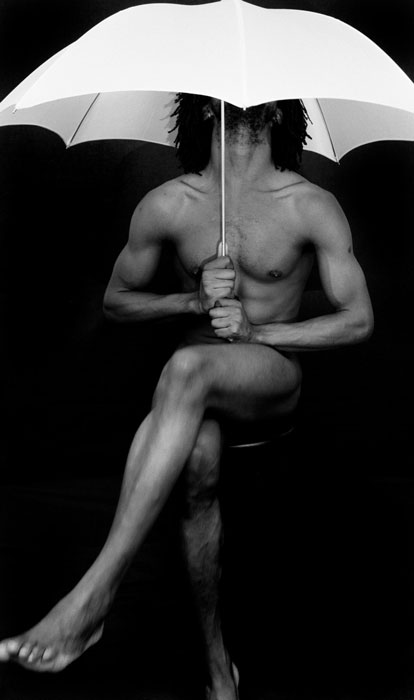Rotimi Fani-Kayode's photographs constitute a profound narrative of sexual and cultural difference – seminal in their exploration of the politics of desire, diaspora, displacement, spirituality and the black male body. Although his career was cut short by his untimely death at the age of 34, Fani-Kayode remains one of the most significant names in the history of black photography.
Autograph's retrospective exhibition of Fani-Kayode's photographs, in partnership with Light Work, toured to the Maria & Alberto de la Cruz Art Gallery at Georgetown University.

A founding member and chairman of Autograph, Fani-Kayode was actively engaged in the Black British art scene during the 1980s.
His photographs have been exhibited internationally since 1985, with numerous solo and group exhibitions in Europe, America and Africa. In 2003, his work featured in the African Pavilion at the 50th Venice Biennale, Italy and today his works are represented in major public and private collectors including Tate, Guggenheim Museum; Victoria & Albert Museum; The Walther Collection; The Hutchins Center; Kiasma-Museum of Contemporary Art; and the collection of Yinka Shonibare CBE, amongst others.
Banner image: courtesy Geortown University
Page images from top, left to right: 1) Courtesy Georgetown University. 2) Rotimi Fani-Kayode, Every Moment Counts (Ecstatic Antibodies), 1989. Courtesy of Autograph, London. 3) Rotimi Fani-Kayode, Nothing to Lose XII (Bodies of Experience), 1989. Courtesy of Autograph, London. 4) Rotimi Fani-Kayode, Every Moment Counts II (Ecstatic Antibodies), 1989. 5) Rotimi Fani-Kayode, Grapes, 1989. Courtesy of Autograph, London. 6) Rotimi Fani-Kayode, Cargo of Middle Passage, 1989. 7) Rotimi Fani-Kayode, Adebiyi, 1989. Courtesy of Autograph, London.
Other page images: 8) Rotimi Fani-Kayode, Umbrella, 1987. Courtesy of Autograph, London. 9) Cover of book Rotimi Fani-Kayode & Alex Hirst: Photographs.
Autograph is a space to see things differently. Since 1988, we have championed photography that explores issues of race, identity, representation, human rights and social justice, sharing how photographs reflect lived experiences and shape our understanding of ourselves and others.